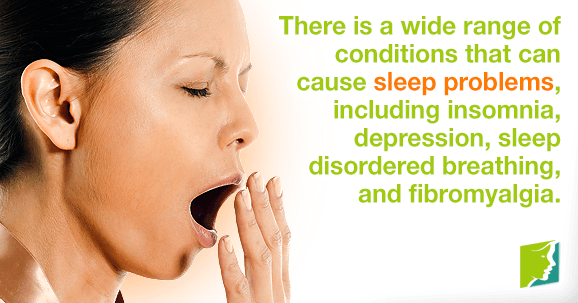Menopausal women are much more likely to report trouble sleeping than the general population. Sleep problems during menopause are often attributed to night sweats and hot flashes, which can have a large, detrimental impact on a woman's sleep pattern. However, there are a wide range of conditions that can cause a woman to not sleep well during menopause. These include insomnia, depression, sleep disordered breathing, and fibromyalgia.
What Is a Sleep Problem? How Do I Know If it Is Related to Menopause?
Quick Fact:
Between 25% and 50% of women will experience some sort of sleep difficulty during menopause, whereas around 15% of the general population reports sleep difficulties.
It can be difficult to say what sleep problems are caused by menopause, which by aging, and which by lifestyle, environmental, or other factors. Keeping a sleep journal can help you to pinpoint what may be triggering your sleep problems.
What Causes Sleep Problems during Menopause?
Menopausal sleep problems is mainly caused by hormonal imbalance. A range of different medical conditions can also cause sleep problems, these are:
Sleep disordered breathing. This umbrella term includes conditions such as sleep apnea and snoring, which can be indicative of a breathing problem or underlying health condition and can cause the sufferer to be sleepier during the day.
Insomnia. This condition is characterized by problems falling asleep, staying asleep, or both. Insomnia does not always have a clear cause, but can be triggered by mental and physical health conditions, poor sleeping conditions, and some medications.
Depression. This mood disorder causes a person to feel chronically sad and hopeless. It is important to see a doctor if you feel you have depression. A doctor will be able to properly diagnose depression, recommend a therapist if appropriate, and prescribe medications, such as antidepressants, to help treat depression.
Fibromyalgia. This condition causes muscle pain throughout a person's body, and its symptoms include trouble sleeping and fatigue. Fibromyalgia affects women much more than it affects men, and there is no known cure for it. However, exercising, reducing stress and the impact it has on your well-being, and prescription medications can reduce fibromyalgia's impact on a person's life.
What Can I Do about Sleep Problems during Menopause?
Quick Fact:
Getting a good night's sleep is critical for overall health, as well as for being happy and able to concentrate the next day.
Being above your recommended weight range exacerbates sleep problems, so staying in a healthy BMI range can help reduce sleep problems. Consult your doctor to get more information on how any underlying conditions you may have can be effectively treated so that you can sleep well and lead a happier and healthier life. Click on the following link for more information about treatments for sleep problems.
Sources
- Australian Menopause Society. (2014). Sleep disturbance and the menopause. Retrieved September 30, 2015, from https://www.menopause.org.au/for-women/information-sheets/32-sleep-disturbance-and-the-menopause
- Eichling, P.S. & Sahni, J. (2005). Menopause Related Sleep Disorders. Journal of Clinical Sleep Medicine, 1(3). Retrieved http://www.aasmnet.org/JCSM/Articles/010312.pdf.
- Garcha, P.S., Aboussouan, L.S., & Minai, O. (2013). Sleep-Disordered Breathing. Retrieved September 30, 2015, from http://www.clevelandclinicmeded.com/medicalpubs/diseasemanagement/pulmonary/sleep-disordered-breathing/Default.htm
- Mayo Clinic Staff. (2014). Fibromylagia. Retrieved September 30, 2015, from http://www.mayoclinic.org/diseases-conditions/fibromyalgia/basics/definition/con-20019243
- National Renewable Energy Laboratory. (2008). Insomnia. Retrieved May 6, 2008, from http://www.nrel.gov/learning/re_biofuels.html




